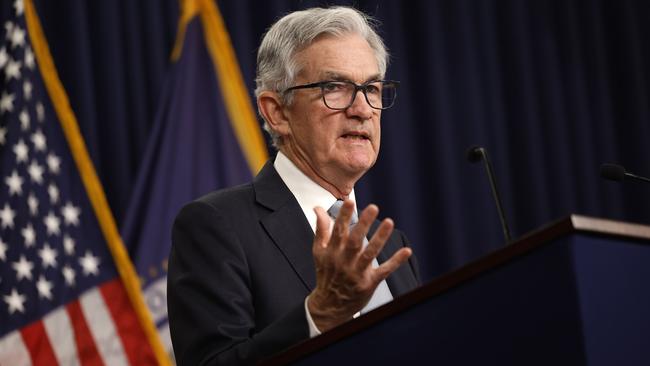US CPI data reinforces expectations the Fed will slow its rate rises
US data suggests to analysts that the Federal Reserve may have cause to moderate its aggressive path of increasing interest rates.

Investors were relieved as markets surged after lower-than-expected US CPI data.
However, analysts cautioned that the US Federal Reserve hasn’t won the inflation battle.
In its best day in over five weeks, Australia’s ASX 200 rose 2.8 per cent to a five-month high of 7158 points on Friday – adding $65bn in market capitalisation – after a 5.5 per cent rise in the S&P 500. It was the biggest rise in the US since April 2020.
The Aussie dollar climbed almost 4 per cent to a seven-week high of US66.61c and copper futures soared 5.7 per cent as the US dollar lost some of its interest rate support.
Australia’s 10-year bond yield dropped 17 basis points to 3.67 per cent, but the US 10-year Treasury yield dived 26 basis points to 3.84 per cent as the US CPI data reinforced expectations that the Fed will slow its rate hikes next month.
US headline CPI inflation cooled to 7.7 per cent year-on-year and 6.5 per cent for the core rate.
The outcomes were still far above the 2 per cent target of the Federal Reserve.
However, they were well below expectations of 8 per cent and 6.5 per cent respectively.
Similar undershoots of US CPI expectations this year proved to be false dawns.
But economists were encouraged by a drop in core goods prices as used-car prices fell sharply. The details of core services inflation were also encouraging, with health insurance down and owner’s equivalent rents rising at the slowest since May.
“One swallow doesn’t make a summer but looking ahead the expectations of further declines in core goods prices as supply chain pressures continue to ease alongside further declines in health insurance costs, plus an ease in rental pressure, are encouraging signs pointing to further declines in US core CPI,” said NAB senior FX strategist Rodrigo Catril.
“The data is building the case for the Fed to moderate its aggressive interest rate hiking path, and the case for no more hikes will become stronger.”
Investors appeared to embrace the possibility that after boosting the Fed funds rate to almost 4 per cent from near zero since March, the Fed is finally starting to get somewhere.

But Citi warned that markets were over-estimating the “risk-positive” narrative post US CPI.
The slowing of US core inflation to 0.3 per cent month-on-month – the weakest reading in a year – was consistent with Citi’s forecast for 0.3-0.4 per cent month-on-month core inflation in October and November backing a slowing of Fed rate hikes to 50 basis points in December.
“However, we saw little in the report to significantly change our base-case path for inflation or the asymmetric upside risk around it,” says Citi chief economist Andrew Hollenhorst.
“Markets continue to over-estimate the likelihood that some version of the risk-positive transitory inflation, Fed pivot, soft-landing narrative will play out.”
In Hollenhorst’s view, the Fed was “confronting a self-reinforcing rise in wages and prices” and investors shouldn’t extrapolate one month of softer inflation data as indicating inflation was now convincingly on a path toward the Fed’s 2 per cent target.
“The data and market reaction are reminiscent of previous cycles of optimism regarding the ease with which the Fed might quell too-high inflation,” Hollenhorst said.

RBC Capital Markets chief US economist Tom Porcelli said the Fed was “completely overdoing it”, but “it’s hard to create a plausible scenario to derail a 50 basis point hike in December”.
“Much as we expected, inflation is slowing of its own accord right now,” he said.
“This is not policy biting. Not yet. That is still to come, and labour is also slowing. The Fed runs the risk of making things worse than they have to be.”
But Fed chair Jerome Powell has “painted (himself) into a corner” as he “can’t relinquish this tight grip he has on the hawkish narrative” or that financial conditions will ease, thereby unwinding the tightening he has put in place at a time when “there are still plenty of officials that think labour is still strong”.
“Remember, Powell threw Arthur Burns under the bus in his Jackson Hole speech,” Porcelli said.
Others said US inflation would remain problematic in coming months, such that the Fed would have no choice but to keep raising rates in a way that risked causing a recession.

“In turn, this suggests that global equity markets have yet to hit bottom, notwithstanding a potentially solid ‘bear market rally’ in coming weeks in expectation of a smaller US Fed rate increase next month,” said BetaShares chief economist David Bassanese.
While US inflation had likely peaked, it remained unclear how quickly it would fall in coming months and whether it would be enough to allow the Fed to “pivot” to cutting interest rates and steer the US economy from the path of recession “just in the nick of time”.
“Indeed, with a very tight labour market and solid wage growth, service sector US inflation – which accounts for three quarters of core inflation – may well remain sticky in coming months,” Bassanese said.
“The lagged impact of past US house prices gains will keep rental price inflation high for some time, and wage costs should continue to filter through to higher prices for a range of services.”




To join the conversation, please log in. Don't have an account? Register
Join the conversation, you are commenting as Logout